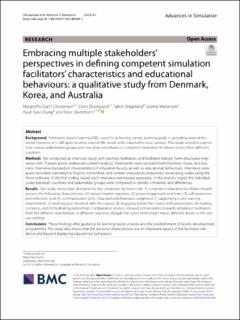| dc.contributor.author | Christensen, Margrethe Duch | |
| dc.contributor.author | Østergaard, Doris | |
| dc.contributor.author | Stagelund, Søren | |
| dc.contributor.author | Watterson, Leonie | |
| dc.contributor.author | Chung, Hyun Soo | |
| dc.contributor.author | Dieckmann, Gerhard Peter | |
| dc.date.accessioned | 2023-10-11T12:33:51Z | |
| dc.date.available | 2023-10-11T12:33:51Z | |
| dc.date.created | 2023-09-26T10:30:56Z | |
| dc.date.issued | 2023-01 | |
| dc.identifier.citation | Christensen, M.D., Østergaard, D., Stagelund, S., Watterson, L., Chung, H.S., Dieckman, P. (2023) Embracing multiple stakeholders’ perspectives in defining competent simulation facilitators’ characteristics and educational behaviours: a qualitative study from Denmark, Korea, and Australia. Advances in Simulation, 8, 1. | en_US |
| dc.identifier.issn | 2059-0628 | |
| dc.identifier.uri | https://hdl.handle.net/11250/3095824 | |
| dc.description.abstract | Background
Simulation-based learning (SBL), used for achieving various learning goals, is spreading around the world. However, it is still open, to what extend SBL needs to be adapted to local cultures. This study aimed to explore how various stakeholder groups perceive what constitutes a competent simulation facilitator across three different countries.
Methods
We conducted an interview study with learners, facilitators, and facilitator trainers. Semi-structured interviews with 75 participants underwent content analysis. Participants were recruited from Denmark, Korea, and Australia. Interviews focused on characteristics of simulation faculty, as well as educational behaviours. Interviews were audio-recorded, translated to English, transcribed, and content analysed by inductively developing codes using the Nvivo software. In the first coding round, each interview was treated separately. In the analysis round, the individual codes between countries and stakeholder groups were compared to identify similarities and differences.
Results
Our study shows high demands for the simulation facilitator role. A competent simulation facilitator should possess the following characteristics: (1) subject matter expertise, (2) personal approach and traits, (3) self-awareness and reflection, and (4) communication skills. Educational behaviours comprised (1) supporting a safe learning environment, 2) working goal-oriented with the course, (3) engaging before the course with preparation, (4) leading scenarios, and (5) facilitating debriefings. Comparative analysis showed similar wishes towards simulation facilitators from the different stakeholders in different countries, though the same terms might mean different details in the various settings.
Conclusions
These findings offer guidance for learning needs analysis and the establishment of faculty development programmes. The study also shows that the personal characteristics are an important aspect of the facilitator role above and beyond displaying educational behaviours. | en_US |
| dc.language.iso | eng | en_US |
| dc.publisher | BioMed Central | en_US |
| dc.rights | Navngivelse 4.0 Internasjonal | * |
| dc.rights.uri | http://creativecommons.org/licenses/by/4.0/deed.no | * |
| dc.subject | simuleringsbasert opplæring | en_US |
| dc.title | Embracing multiple stakeholders’ perspectives in defining competent simulation facilitators’ characteristics and educational behaviours: a qualitative study from Denmark, Korea, and Australia | en_US |
| dc.type | Peer reviewed | en_US |
| dc.type | Journal article | en_US |
| dc.description.version | publishedVersion | en_US |
| dc.rights.holder | © The Author(s) 2023 | en_US |
| dc.subject.nsi | VDP::Medisinske Fag: 700::Helsefag: 800 | en_US |
| dc.source.pagenumber | 0 | en_US |
| dc.source.volume | 8 | en_US |
| dc.source.journal | Advances in Simulation | en_US |
| dc.identifier.doi | 10.1186/s41077-022-00240-1 | |
| dc.identifier.cristin | 2178873 | |
| dc.source.articlenumber | 1 (2023) | en_US |
| cristin.ispublished | true | |
| cristin.fulltext | original | |
| cristin.qualitycode | 1 | |

